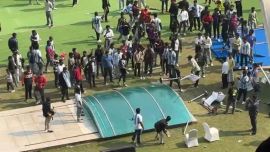With three teams still gunning for the title and just a handful of games still left to play the conclusion to the 2022 Liga de la Profesional promises to be one of the most exhilarating in recent memory. But while Boca Juniors, Racing Club and Atlético Tucumán have been battling it out, once more events off the field have cast a long shadow.
Last Thursday's visit to La Plata was an opportunity for Boca to strengthen their bid to win an unlikely Liga crown after their mixed start to the season, but the game had barely even begun before it was forced to be halted. Outside Gimnasia's Bosque home police had turned on irate fans still trying to get into the ground after kick-off, charging their ranks with mounted units while firing off hails of rubber bullets and a toxic cloud of tear gas.
Such was the bombardment that even the two teams inside the stadium were left glassy-eyed as they choked on the fumes, while in the crowd the effect was absolute chaos. One Gimnasia fan lost his life after suffering a heart attack in the middle of the crush and hundreds more were wounded, including a TyC Sports cameraman who filmed live as an officer fired a hail of rubber bullets into his groin at point-blank range.
Against that backdrop, Boca and Gimnasia somehow managed to fit in around eight minutes of play before it became apparent that the game had to be halted. “We did not know what was happening outside until we got to the dressing room,” Xeneize coach Hugo Ibarra revealed later. “It was a pitched battle out there... and we have to mourn a victim, which hurts the most. It was a party and suddenly it turned into something else. I am so sorry.”
It was a party... right until it became something else. Words which would be apt for almost any footballing tragedy in history, and a reflection of just how quickly things can turn when one is dealing with thousands of adrenaline-fuelled individuals pushing towards one ultimate destination. To avoid such events is precisely why everyone involved must act with responsibility and foresight, from the clubs hosting big games to the security forces charged with protecting those in attendance.
That, of course, did not occur on Thursday evening. Gimnasia stood accused of over-selling tickets to the clash, allegations which the club has vehemently denied, but at the very least there was clear negligence in organising the entrance to the game on a weekday, which, along with the fact that match-goers would have to contend with thousands of tourists heading to the coast on the eve of the long weekend, all but guarantees a flood of late arrivals to the gates. Yet final responsibility must lie with the Buenos Aires provincial police force, which once more showed its glaring limitations.
It is a force dressed and seemingly prepared for battle, with its mounted steeds, camouflage kits and impressive array of weaponry. But a football match, despite occasional indications to the contrary, is not a war. The ability to defuse tense situations is needed, and throughout its long history the Bonaerense – far from the exception, as it is merely one of a very bad bunch when it comes to provincial police services – has shown time and again that its primal instinct is to confront and escalate. Anyone who has attended a game in the province can attest that the first thought on officers' minds is simply to see out the 90 minutes, pick up their overtime pay and get out as soon as possible, and anything which threatens to make that task more difficult is likely to be met in a less than kindly fashion.
Small consolation it may be, but things have actually improved in and around Argentine grounds these past decades. Once one removes the rose-tinted spectacles they can observe that the game is far safer for fans than in the much longed for golden age of the 1970s and 1980s, where bloody clashes with police of the dictatorship era and shocking episodes of violence (in the absence of camera phones, now largely transmitted through coffee house story-telling) were the norm and families generally gave the game a wide berth. But Thursday's tragic events just go to show how much work still needs to be done, starting with a comprehensive overhaul of policing itself in such situations.



















Comments